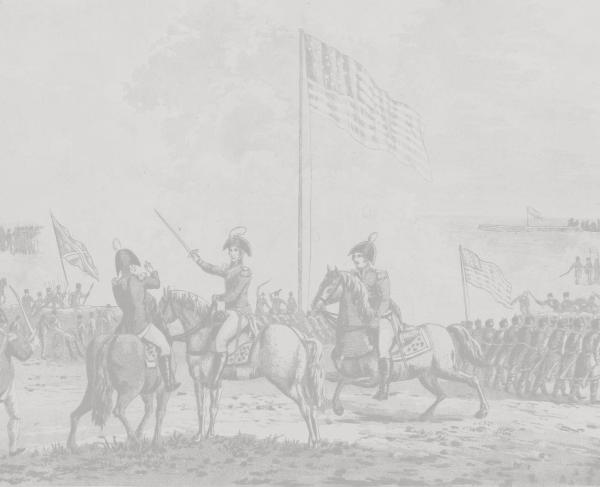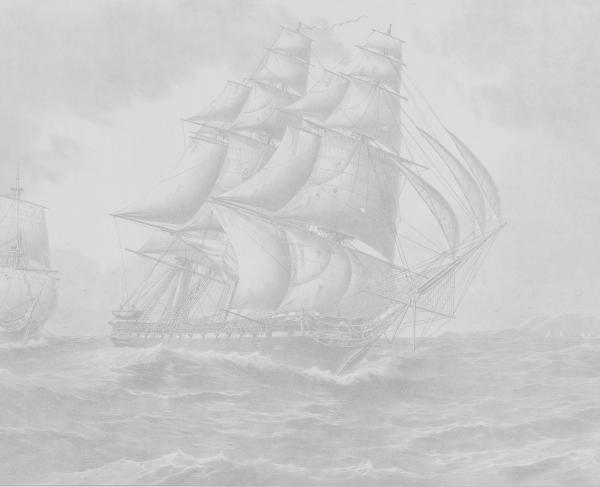British Secretary of the Admiralty John W. Croker’ letter to Admiral John Borlase Warren Detailing British Naval Supremacy and Tactics During the War of 1812

After the defeat of HMS Guerriere on August 19, 1812, and the HMS Java on December 29, 1812, British Secretary of Admiralty John W. Corker reassures Admiral John Borlase Warren, commander-in-chief of the North American station, of Britian's navel strength.
Sir,
I have this day received your several despatches numbered in the margin, dated the 20th and 26th of last month; and as the subjects to which they relate are very much connected and blended together, I have received the commands of my Lords Commissioners of the Admiralty to communicate to you in one dispatch their general observations and Instructions on the whole…
With regard to the watching Boston, I am to state to you that my Lords are aware that this Port cannot be effectively blockaded from November to March, but they must also observe that Commodore Rogers with United States, Congress, and Argus and Commodore Bainbridge with the Constitution and Hornet appear to have sailed in the month of October, and in the month of December, tho’it was not possible perhaps to have maintained a permanent watch on that Port, yet having as you state in your letter of the 5th November last precise information that Commodore Bainbridge was to sail at a given time, my Lords regret that it was not deemed practicable to proceed off that Port (at a reasonable and safe distance from the land) and to have taken the chance at least of intercepting the Enemy if the weather should not have permitted you to blockade him.
With regard to your future operations and the disposal you propose to make of your force, I have to express to you their Lordships approbation of the general arrangement. They observe however that this arrangement was made before you were aware that four additional Sail of the Line were given to your command, two of which joined in the interval between the writing and dispatching your letters.
This accession of force will enable you to establish a better system of relief than you contemplated at the time you wrote.
On the details of your proposed distribution my Lords command me to state their opinion that in each separate Squadron which you may form, there should, if possible, be one Line of Battle Ship at least; but as your measures must necessarily depend on the state and disposal of the Enemy’s Ships, and on many considerations which cannot be anticipated, they must leave to your own judgement and discretion the appropriation of your force and the measures which it may be right to adopt in counteraction of the Enemy’s views.
My Lords are glad to think that you will consider the amount of force now under your orders as most ample—It exceeds very much what on a mere comparison with the means of the Enemy would appear necessary; and in addition to this great force not less than Ten sail of the Line, as many heavy Frigates, and double the number of sloops are employed for the protection of Trade against the Americans, some of them occasionally within the limits if your Station, the rest in situation to which it appears most probable that the Enemy, escaping from your Station, should direct his operations.
The comparisons which you make between the amount of force employed in the last American war and the present is by no means just; you will recollect that at the former period the fleets of France were actually in the West Indies and American Waters, and it was chiefly to oppose them that so great a force was then necessary.
If the french (as is perhaps not improbable) should push out a force to succor the Americans, my Lords would and will feel it their duty to increase your Squadron in an equal or even greater proportion; but the force now permanently under your orders of upwards of 100 Pendants and 16- or 1700 Men, they have placed at your disposal to be employed against an Enemy whose principal Ports are capable of being blockaded, and whose force according to the statement inclosed in your letter No. 78 consists of 4 large and 3 smaller frigates, and 1 Sloop and 4 Brigs in Commission, manned by 3400 men, and of two or three small frigates in a state of forwardness.
With regard to the state of the Squadrons under your orders, as to their Complements of men, which you represent as being very short, my Lords observe from your state and condition of the 21st February and from those of Jamaica and the Leeward Islands of the 31st January that on a full Complement of 14673 your fleet was only 727 short, while on the other hand there appear to have been 1388 Supernumeraries in the Squadrons, leaving (if the accounts be correct) 661 men over and above the full Complements of the several ships…
With respect to the observation which you take occasion to make on Admiral Stirling’s proceedings, and the opinion which you intimate that the several Commands should be so far separated, at that while you retained a general authority over the whole, the divisional flag officers should have a greater share of responsibility than is at present, as you conceive, imposed upon them, I am on the first point to observe to you, their Lordships agree with you in disapproving Admiral Stirling’s proceedings in the particulars referred to, and will not fail to acquaint him that they do so; and on the subject of the conveyance of Specie they direct you to give orders that in the future no Sum exceeding £100,000 be sent home in less than a heavy frigate; and if a Sum of £500,000 should be likely to be collected, you are to be appropriate a Line of Battle Ship to it’s conveyance—But on the 2nd point, my Lords command me to say that they do not exactly comprehend your proposition, or how the Junior Officers can be at once under your orders and separately and distinctly responsible—
You observe that all that you would wish to consider as being within your power, are the general Stations of the force, the power of withdrawing or adding to the force on each Station, and the Convoys being regularly attended to—These, my Lords agree with you, are the principal points on which the interference of the Commander in Chief is likely to be called for; but how these most important subjects are to be separated from the general responsibility of an Admiral their Lordships do not see.
It was with the view of giving unity and effect to our operations against a single Enemy that the stations were united into a single command. If you should find that you are unequal to the management of so extensive a duty, it would be better, in their Lordships opinion, to have again three distinct and responsible Commanders in Chiefs, than to have three officers with divided Authority and mixed responsibility…
The obvious course is that you should allot to the divisional Admirals such force as from your view of the state and dispositions of that of the Enemy you may judge necessary or expedient; that you should give them, and discretional orders on such subjects as may admit of them, and discretional orders where they may be most proper; and for the execution of these and for the due employment of the force you entrust to them, they must be held responsible in the first degree to you, but thro’ you to their Lordships and His Majesty in the same manner that all other divisional Admirals now are, and at all times, and in all situations, have been; and while mu Lords recommend and expect the most conciliatory conduct on the one part, and cordial cooperation on the other, they command me to say that they will not fail to visit any contravension of your commands as strongly as of their own…
Finally my Lords command me to recall to your attention my several letters of the dates named in the margin, and to recommend to you the most active and vigorous prosecution of the War during the Season when the whole of the American Coast in accessible by your Squadron, and which will admit of your placing all the Enemy’s Ports in a state of close and permanent Blockade…
J.W.C
P.S. I am further to signify their Lordships particular approbation of the measures your propose to take for the protection of the Trade and Convoys destined for the River St Lawrence.

